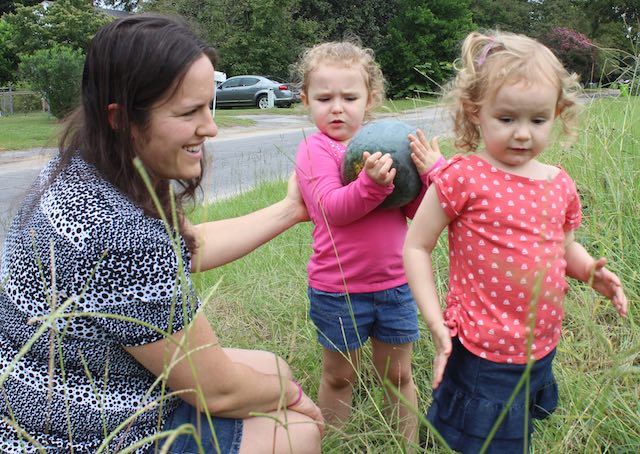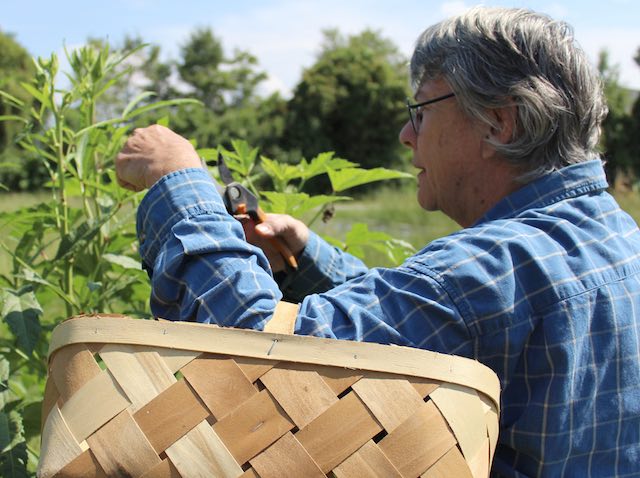Olympia residents harvest more than fresh produce from new garden
by Reporting Students • November 6, 2015 • All Stories, Neighborhoods • 0 Comments
Olympia’s Organic Hope garden grew from an unlikely partnership. It’s provided the community with produce and more since May. But now it’s choked with weeds, and the woman behind it says it might be time for change.
By Andrew Moore
Nov. 6, 2015
Once an empty field in Olympia, Organic Hope community garden is completing its first season of giving residents fruits and vegetables – and some life lessons as well.
It all started when Devon Jeremy needed a gutter for her home, called Wise Guys Home Improvement in 2013 and found a partnership with owner and fellow Olympia resident Rob Lindsey.
“We talked longer each time he came over to work, and I found that we resonated about sustainable living,” Jeremy said. “And I told him about the field.”

Organic Hope co-founder Devon Jeremy says this year’s harvest was good but that she also sees more weeds and is thinking of ways to give residents more sense of ownership.
Richland County had told Jeremy earlier that year she could plant the 1.5 acres at Granby Lane and Quarry Street, across from her home. Lindsey was interested.
Only months before he had helped plant a garden in Olympia Park. But it wasn’t until this year that Lindsey returned with a plan to make Organic Hope a reality and began by seeking local support.
“It was so difficult to find someone to plow a field in spring,” Lindsey said.
City Roots, an urban farm near Hamilton-Owens Airport, donated okra, tomatoes, sweet potatoes and herbs. A community member donated seeds for Bradford watermelons that were popular in the 1920s, went almost extinct and now are regaining popularity.
Lindsey bought other crops like eggplant, squash, corn and peppers, and the first plantings were this past May.
Jeremy hoped the garden would become a place where people could talk about issues in the neighborhood while growing their meals. And it was for a while.
But now it’s overgrown with weeds, which has Jeremy thinking about the reason and the future. She thinks people might have lost interest because they didn’t have individual plots.
“I really want people to have their own spaces next year,” she said. “I think it will offer more hope for the garden.”
Kat Kaster, who lives across from Organic Hope, has used the garden’s basil and more but says she lost interest after the “grass came back with a vengeance.” It will take “a lot of work and preparation” for people to start using it again, she said.
Organic Hope is one of three gardens that have sprung up in Olympia since 2011. There is the one Lindsey helped plant in Olympia Park, and the third is in Pacific Park.
Community gardens like Organic Hope can be “good social spaces” and “tools for community organizing,” said Carrie Draper, a research associate at USC’s Center for Research in Nutrition and Health Disparities.

Olympia resident Brana Wallace uses Organic Hope to educate her two daughters, Lilla, 3, center, and Chloe, 4, about gardening.
And Michigan State University professor Katherine Alaimo has found that adults are more likely to eat healthier when someone in the family uses a community garden. Diets can change when there is “more fresh food available to them in the refrigerator,” Alaimo said.
Gardens can also provide hands-on learning. Brana Wallace, who lives across from Organic Hope, has used it since May to teach her daughters, ages 3 and 4, about the life cycle and maintenance of gardening.
“We actually helped plant squash, and the girls really enjoyed watching them grow from seedlings,” she said.
Seeing Wallace and her girls use the garden inspired Jeremy. She plans to invite local schools to Organic Hope for lessons about gardening, insects, prey-predator balance and more.
“There is so much potential for education in this little piece of land,” Jeremy said. “I want to get kids excited so that they garden at their schools or even in their backyards.”
Community gardens started declining in the mid-1900s but rebounded in the 1970s in response to rising food prices, urban abandonment and more, according to “City Bountiful” by Laura Lawson. Interest declined again in the 1980s, but community gardening re-emerged in the 1990s as sustainable living programs expanded.
In Columbia, the Edisto Court and Rosewood communities planted gardens in 2006. Rosewood also planted a fruit and nut tree orchard at Owens Field Park in 2011.
Links
|
Since 2011, Columbia residents have also been able to lease a 5-by-12-foot plot at Hyatt Park, Earlewood Park or Granby Park for $20 a year. The demand has the city looking at adding locations, said Jacqueline Williams, the parks department’s community coordinator.
Keyhole gardens, circular raised beds with a center compost bin, are opening at St. Anna’s Park and Hyatt Park in the coming months. And Granby, next to Olympia, is getting a community garden, said Bob Guild, Granby Neighborhood Association president.
“It’s an opportunity to not only get some great produce, but to also educate young people about organic gardening, permaculture and respect for the land,” he said.
Among the weeds at Organic Hope, Jeremy sees an opportunity for “more structure” with individual box plots. Such plots are a strong way to keep people committed by creating a sense of ownership, said Allie Mason, garden coordinator at the University of South Carolina.
No matter what form Organic Hope takes, Jeremy hopes Olympia will continue to support the garden and its mission.
“The only way we’re going to address the issue of broken communities is to teach community,” she said. “And growing food is a good place to start.”

